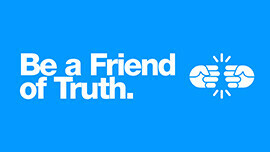 bronze
bronze

In an age of disinformation, it’s good to be a friend of truth.
Disinformation is a global mental health crisis.
Disinformation destabilizes, demotivates, and creates wedges of polarization that erode trust between people. My thesis at Portland State is the strategic use of graphic design to counter disinformation and empower media literacy. By inviting people to “Be a Friend of Truth,” I share with those interested in learning the warning signs of disinformation.
My goal is for all of us to be friends of truth—a friend of provable, knowable truth.
Misinformation is a mistake.
Disinformation is a lie.
Disinformation is false information deliberately and covertly spread to influence public opinion or obscure the truth. The person or persons engaged in disinformation are incentivized in a material interest (financial, power, political, ideological) to act for themselves or on behalf of others.
This was the daunting challenge: by meeting the moment by clarifying the threat and practicing empathy, the reader is navigated from disinformation to finding proveable, knowable fact.
My solution is titled, “Friends of Truth”. It’s a simple website that poses questions and demonstrates how to become more media savvy. In addition, I curated a podcast and interviewed key figures who have written about disinformation. To cap it off, I also created single-subject postcards that can be left as a viral accompaniment to the campaign.
The results: BeAFriendOfTruth.com went live, the Be a Friend of Truth podcast went live and was launched to a global english-speaking audience receptive to the message.
The events of the 2024 election and the 2020 global COVID-19 pandemic make it clear we live in the blast radius of disinformation. Tools to combat disinformation present the threat and help the reader to identify the lie.
Grammarly and ChatGPT were used for spellcheck and grammar correction.